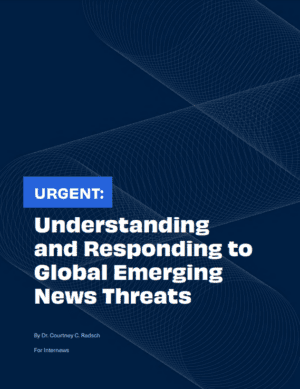Read the Report
URGENT: Understanding and Responding to Global News Threats, new research authored by Dr Courtney Radsch and published by Internews, calls for bold strategies, more money, and a collective infrastructure to support independent public service media and its role in democratic governance worldwide. It sets out a series of recommendations about out how donors, implementers and diplomatic actors must reassess their approaches if they are to effectively support public interest media and address the increased precarity for media globally.
The recommendations are based on interviews and surveys with journalists working in contexts where pressure is building, where a recent crisis has upended the media sector and where many have been forced into exile. They emphasize the need for the media assistance community to recalibrate support to match evolving dynamics and identifies acute needs of journalists and media in these situations, as well as longer term and structural needs. These include a greater focus on preparedness; holistic physical, digital, legal, and psychosocial support that is readily available and tailored to their needs; more flexible funding to build their businesses, prepare for unexpected events, and absorb shocks; better access to data and analytics capacity and tech expertise, and increased engagement with the technology companies that shape their ability to connect with audiences, particularly at times of crisis.
In addition, the report elevates the specific needs of journalists forced into temporary or permanent exile, who can play a vital role reporting on their countries of origin but need support to adapt to new realities and safely transition their operations.
Importantly, it finds that a holistic approach to media assistance which includes the provision of money, technical assistance and collaborative strategic programming and advocacy, while also improving the global enabling environment is urgently needed. And it underscores the role that US and European policies play in the global information ecosystem and urges donor countries to take a more comprehensive approach to foreign assistance that includes addressing domestic immigration and technology policy frameworks.
